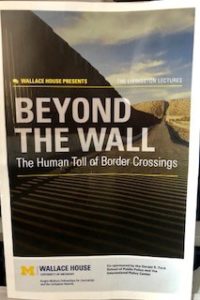I was intrigued by the title–Beyond The Wall: The Human Toll of Border Crossings. This lecture was sponsored by Wallace House and given at the Ford School of Public Policy at the University of Michigan on Wednesday, January 31, 2018.
 There were three speakers: Brooke Jarvis, Jason De Leon and Ann Lin.
There were three speakers: Brooke Jarvis, Jason De Leon and Ann Lin.
I was especially intrigued by Brooke Jarvis, a journalist and 2017 winner of the Livingston Award for her story “Unclaimed “. It was featured in The California Sunday Magazine in 2017.
About 18 years ago, a man was found in the desert of the southwest United States. There had been some kind of accident and he was taken unconscious to the hospital. He was in very bad shape.
The man had no identification, and because he was unconscious, no one could ask him who he was. This man was kept alive for years on respirators. But, who was he? What was his name? Where did he come from? Did he have family waiting for him?
Eventually, after 18 years, a Border Patrol Agent came to see him. He was determined to find out who this man was. He ordered the man’s information put in several government databases. Within two days the man was identified and his sister located.
For families of people who try to come to the United States illegally, a source of great trauma is, if they don’t make it, how does the family find out what happened? For years these families suffer–wondering, worried and traumatized.
Our current border walls and surveillance systems in the southwest United States are quite secure. The only way left to try to cross illegally is through the desert. Many people, if not most, die because of the terrain, lack of water and the terrible heat.
Currently there are about 800 bodies in morgues in the southwest United States waiting to be identified. There are also online websites for families seeking information about their loved ones who never arrived.
Wouldn’t it be humane, once someone has died trying to cross, to let their families know? Technology has advanced so much that this could be done by the repatriation of bodies or DNA evidence.
What do you think?

1 ping